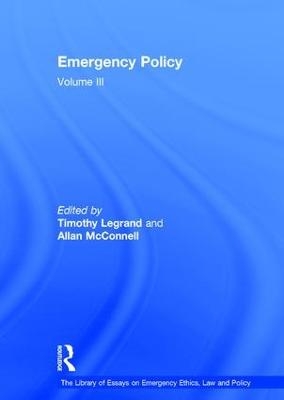
Emergency Policy
Routledge (Verlag)
978-1-4094-4077-2 (ISBN)
This volume of leading scholarly articles addresses the international dynamics of emergency policy and practice. In a world of increasing technological, economic and political interdependency, it is no longer feasible for states to ignore the pervasive influence of globalisation. The crises wrought by industrial disasters, catastrophic weather events, pandemics, financial implosion and cyber intrusion now transcend and challenge national interests with increasing frequency. The case-studies collected here explore these global dimensions of crisis and the state through the lenses of planning and prevention, acute responses, recovery and reconstruction, and learning about crisis. This collection is essential reading for academics, policy officials and practitioners with an interest in emergency management, risk management and issues of national/global security. In original introductory and concluding chapters to the volume, Legrand and McConnell provide a critical perspective on the challenges that globalisation presents to policymakers under crisis conditions and signposts some of the emerging challenges to the state and international community.
Timothy Legrand is a Research Fellow of the Centre of Excellence in Policing and Security, Griffith University, Australia and Allan McConnell is Professor in the Department of Government and International Relations at the University of Sydney, Australia.
Contents: Introduction; Part I Prevention and Planning in a Globalized World: Preparing for the world risk society: towards a new security paradigm for the European Union, Arjen Boin and Magnus Ekengren; Governing by looking back: historical analogies and crisis management, Annika Brändström, Fredrik Bynander and Paul 't Hart; Crisis management: toward a new informational 'localism' in local government reform, Alan Jarman, Kevin Sproats and Alexander Kouzmin; A new cosmology of risks and crises: time for a radical shift in paradigm and practice, Patrick Lagadec; Megacities as global risk areas, Frauke Kraas; Preventing transboundary crises: the management and regulation of setbacks, Emery Roe; Strategies for high risk reduction and management as global responsibility, Lorenzo Miccoli and Francesca Destefano. Part II Acute Responses and Influences Beyond the Nation-State: Managing transboundary crises: identifying the building blocks of an effective response system, Chris Ansell, Arjen Boin and Ann Keller; International crisis response and a Canadian role, Jane Boulden; Institutional and political leadership dimensions of cascading ecological crises, Victor Galaz, Fredrik Moberg, Eva-Karin Olsson, Eric Paglia and Charles Parker; The policy-media interaction model: measuring media power during humanitarian crisis, Piers Robinson; September 11: public administration and the study of crises and crisis management, Uriel Rosenthal; Communication management during risk events and crises in a globalised world: predictability of domestic media attention for calamities, Bastiaan C.J. Zoeteman, Wouter C. Kersten, Wiebe F. Vos, Lieke van de Voort and Ben J.M. Ale; Globalisation, complex humanitarian emergencies and health, T.J.D. O'Dempsey and B. Munslow. Part III Recovery and Reconstruction in the Shadow of Globalization: Towards the development of a standard in emergency planning, David Alexander; Enhancing disaster recovery: lessons from exemplary international disaster management practices, Jeffrey D. Garnett and Melinda Moore; Post-disaster recovery dilemmas: challenges in balancing short-term and long-term needs for vulnerability reduction, Jane C. Ingram, Guillermo Franco, Cristina Rumbaitis-del Rio and Bjian Khazai; The shock doctrine: a discussion, Naomi Klein and Neil Smith; Humanitarian crises: what determines the level of emergency assistance? Media coverage, donor interests and the aid business, Gorm Rye Olsen, Nils Carstensen and Kristian Høyen; Neoliberalism, INGO practices and sustainable disaster recovery: a post-Katrina case study, Loretta Pyles; The international humanitarian system and the 2004 Indian Ocean earthquake and tsunamis, John Telford and John Cosgrave. Part IV The Possibilities of Crisis Learning in a Globalized World: Coastal oil pollution: spills, crisis, and policy change, Rick S. Kurtz; Learning from exemplary practices in international disaster management: a fresh avenue to inform US policy?, Melinda Moore, Horacio R. Trujillo, Brooke K. Stearns, Ricardo Basurto-Davila and David K. Evans; Disaster risk, climate change and international development: scope for, and challenges to, integration, Lisa Schipper and Mark Pelling; Resisting neo-liberalism: the poisoned water disaster in Walkerton, Ontario, Laureen Snider; Rethinking the nature of disaster: from failed instruments of learning to a post-social understanding, Stewart Williams; Conclusion; Name index.
| Erscheint lt. Verlag | 5.12.2012 |
|---|---|
| Reihe/Serie | The Library of Essays on Emergency Ethics, Law and Policy |
| Verlagsort | London |
| Sprache | englisch |
| Maße | 174 x 246 mm |
| Gewicht | 1247 g |
| Themenwelt | Naturwissenschaften ► Biologie ► Ökologie / Naturschutz |
| Recht / Steuern ► Allgemeines / Lexika | |
| Recht / Steuern ► Arbeits- / Sozialrecht ► Sozialrecht | |
| Recht / Steuern ► EU / Internationales Recht | |
| Sozialwissenschaften ► Politik / Verwaltung | |
| Wirtschaft ► Volkswirtschaftslehre | |
| ISBN-10 | 1-4094-4077-X / 140944077X |
| ISBN-13 | 978-1-4094-4077-2 / 9781409440772 |
| Zustand | Neuware |
| Haben Sie eine Frage zum Produkt? |
aus dem Bereich


